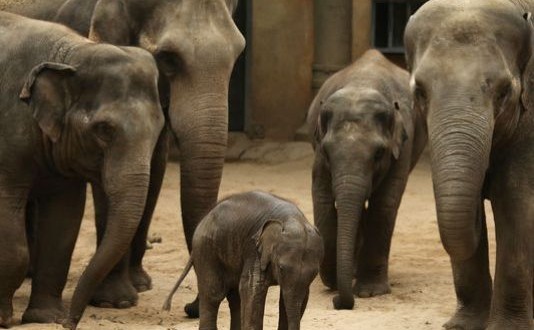Elephants may hold the key to fighting cancer after scientists found that they carry a large number of genes that suppress tumours.
The animals have 38 extra copies of an important gene known as p53 that makes cancerous cells self-destruct before they become dangerous.
Humans only have two. But because elephants have so many, they rarely get cancer — despite the fact that they are so large and live for so long usually meaning that they would be predisposed to it.
Dr Joshua Schiffman, an oncologist at the University of Utah School of Medicine in the US, who co-led the research, said: “By all logical reasoning, elephants should be developing a tremendous amount of cancer, and in fact, should be extinct by now due to such a high risk for cancer.
“We think that making more p53 is nature’s way of keeping this species alive.”
The gene, nicknamed “the guardian of the genome”, produces a protein that can trigger either the rescue or destruction of damaged cells.
On the one hand p53 is able to “re-boot” cells and switch on DNA repair mechanisms. Alternatively, it might signal the cell to commit suicide – a process known as apoptosis.
If p53 develops a fault it can leave people at the mercy of cancer.
Patients with a condition called Li-Fraumeni Syndrome have only one working copy of p53 and a more than 90% lifetime cancer risk.
Because elephants have 100 times more cells than humans, they should be 100 times more likely to have a cell slip into a cancerous state over a long life-span of 50 to 70 years.
Yet a large analysis of elephant deaths showed that fewer than 5% of the animals die of cancer, compared with up to a quarter of humans.
The numerous extra copies of p53 genes were discovered when scientists combed through the DNA of the African elephant.
Laboratory tests showed how the gene led elephant white blood cells whose DNA had been damaged to commit suicide.
Elephant cells exposed to radiation self-destructed at twice the rate of normal human cells and more than five times the rate of cells taken from Li-Fraumeni patients.
Dr Schiffman said: “If you kill the damaged cell, it’s gone, and it can’t turn into cancer. This may be more effective of an approach to cancer prevention than trying to stop a mutated cell from dividing and not being able to completely repair itself.”
He added: “Nature has already figured out how to prevent cancer. It’s up to us to learn how different animals tackle the problem so we can adapt those strategies to prevent cancer in people.”
The findings are reported in the Journal of the American Medical Association.
British expert Professor Mel Greaves, director of the Centre for Evolution and Cancer at London’s Institute of Cancer Research, who co-authored an editorial on the research in the journal, said: “It is not immediately clear what lessons there are from this elephant tale for risk of cancer in humans.
“The main impact of this remarkable story is to bring into focus the question of why we are so uniquely predisposed to cancer for our size and lifespan – and what we can do to change this.”
Agencies/Canadajournal
 Canada Journal – News of the World Articles and videos to bring you the biggest Canadian news stories from across the country every day
Canada Journal – News of the World Articles and videos to bring you the biggest Canadian news stories from across the country every day



